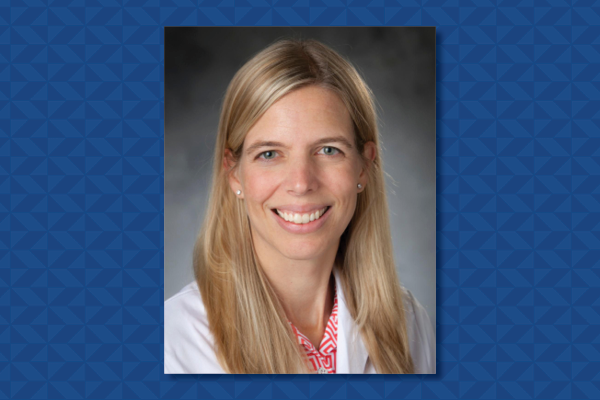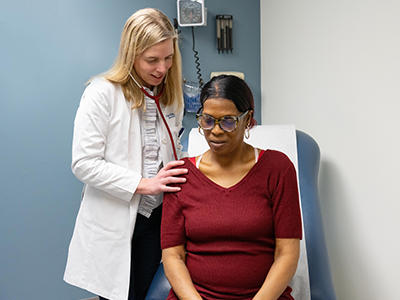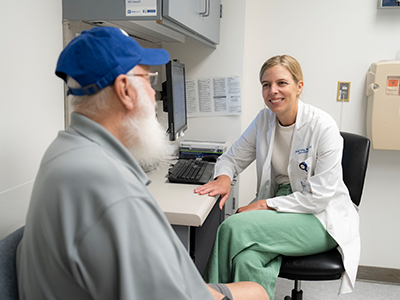
“Caring for patients before a transplant while they’re really sick, having the transplant done, and taking care of them long-term afterwards, is what really drew me to transplantation,” said, Lindsay King, MD, MPH, associate professor of Medicine in the division of Gastroenterology.
She’s a hepatologist and sees patients through the onset and progression of liver disease, organ transplantation and provides post-transplant care. “You’re really on a life-long journey of caring for your patients,” she said.
Dr. King is the medical director of the Duke Adult Liver Transplant Program and the Duke Transplant Clinic. She works with nurse coordinators, social workers, psychologists, cancer specialists, pathologists, surgeons, and radiologists, to provide a full spectrum of care and enhance patient outcomes.
“It takes a village to care for these patients. The liver impacts multiple different organs, so you must work with many different providers,” Dr. King said. “I'm just one part of a whole team and it's really incredible to see how everyone can work together.”
She treats patients with liver disease four days a week in the outpatient clinic, and rounds in the in-patient consult and transplant service at Duke University Hospital. “With liver disease, data helps drive treatment plans along with our clinical judgment and experiences. But it is a shared decision, one we make with the patient and their caregivers in mind,” Dr. King said. However, she wants to see hepatologists brought into the conversation sooner.

“I want to meet patients before they’re sick because it’s easier to develop a longitudinal relationship. Then I want to answer the question, ’how do we prepare patients and their family for a journey they may or may not need down the road?’”
Medicine is a field she was always close to, growing up, both her parents were physicians. But it wasn’t until college that she solidified an interest in health care. “I started volunteering at Wake Forest Baptist Hospital and after working in the emergency room, I realized I really enjoyed working with patients. I decided with that and a love of science, that I was going to go pre-med,” she said.
Dr. King attended the University of Virginia School of Medicine where her first rotation was on transplant surgery. “I ended up watching a donor procurement, then a recipient transplant,” Dr. King said. “It was surreal to watch a transplant, watch an organ come from a deceased donor and go into a living recipient and work, and see how you could cure complex diseases using these organs.”
Dr. Carl Berg, a hepatologist and Professor Emeritus at Duke, served as her mentor. “He was so enthusiastic about the liver and liver transplant, and I thought, ‘I am going to be a hepatologist one day,’” Dr. King said. Her passion for treating liver disease deepened while working on the gastroenterology service as an internal medicine resident at Brigham and Women’s Hospital.
“I liked the specialization of hepatology and liver. I have patients that live with liver disease that you can make better and don't need a transplant. But you also have transplant as an option if they get sick,” Dr. King said. “Transplantation has really evolved over my years of practice with increased organ access through newer machine perfusion and expanding indications for liver transplantation,” she said.
After serving as chief resident, she earned a Master’s in Public Health from Harvard University, completed a Clinical and Research Fellowship in Gastroenterology at Massachusetts General Hospital, and its one-year Advanced Transplant Hepatology Fellowship. She joined Dr. Berg at Duke and spent the next eight years under his mentorship. Dr. King was later named as program director of the Advanced Transplant Hepatology Fellowship Program in 2018 and then medical director of Adult Liver Transplantation in 2022.
VOLUNTEER AND ADVOCACY
Her work extends well into surrounding communities. “We're consistently working to improve ease and access to transplants and hepatologists,” Dr. King said. She started an outreach clinic at Duke Central Carolina Surgery that’s held once a month in Greensboro.
“I see liver patients there once a month and they’re very grateful. Even though it’s an hour away from us, it’s closer to the patients,” she said. Dr. King is planning to host the clinic in Greensboro twice a month this year and hopes to expand it to other parts of North Carolina one day.

To provide additional support, Dr. King and a team of social workers created a support group for pre-transplant patients and their caregivers, and a support group for post-transplant patients.
Dr. King actively collaborates on creating policies and developing research projects that drive health care innovation. She volunteers for the Organ Procurement and Transplantation Network (OPTN) which addresses transplant policies at the national level.
She is an active member of the American Association for the Study of Liver Diseases where she served on the practice guidelines committee and currently the nominating committee. Additionally, she is a member of the American Society of Transplantation, where she serves as co-chair of the Liver and Testing Committee of Practice and on a fellowship and workforce committee. Dr. King also partners with experts to determine the best practices to transition liver patients from pediatrics to adult care programs.
Her message to trainees, “find a field that brings you intellectual stimulation and pushes you to continue to learn and improve even years into your career. Great colleagues and mentors are a really important part of that,” Dr King said. “The work is busy, but it will get done. Take it day-by-day and be prepared to pivot in case your day doesn’t go quite as planned.”